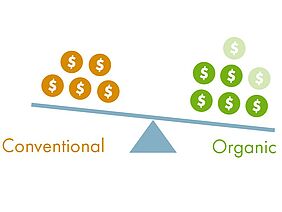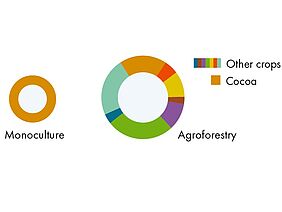Despite technological advancements in food systems since the green revolution, current food systems are failing to meet the needs of both society and the environment. Indeed, the negative side effects of these systems are rarely considered even though these hidden costs add up to almost ten percent of the global economic output. Nowhere are the challenges and hidden costs of current food systems more evident than in the tropics, where disproportionate food insecurity, malnutrition, and impacts of climate change pose significant threats. These obstacles are expected to intensify into the future due to climate change, demographic shifts, political instability, conflicts, and increased demands on natural resources.
FiBL Switzerland’s latest publication, a four-page policy factsheet entitled: "The potential of agroecology and organic: Insights from scientific evidence in the tropics", concisely argues that agroecology and organic can facilitate a beneficial transformation of production systems in the tropics, showing that they 1) can nourish a growing population, 2) are profitable and affordable, and 3) are scalable.
Food security, economic feasibility and climate resilience
Diverse agroecological and organic production systems produce a wide variety of crops, contributing to food and nutrition security in rural communities as well as diversifying income. These systems not only yield up to twice as much as conventional systems but can generate profits on par or even higher than conventional. This, combined with improved climate resilience, biodiversity and soil health results in lower hidden costs for farmers and society at large. Adaptable to different climates and farming conditions, agroecology and organic are scalable solutions vital for transforming food systems at a larger scale.
Overcoming barriers
Although the evidence in favour of agroecology and organic is quite compelling, their full benefits cannot be realised in most countries due to political and institutional barriers and lock-ins. Overcoming present and future challenges will require educated and empowered decision-makers and policymakers who support and develop strategies for transitioning to agroecology and organic.
About the Factsheet
The policy factsheet serves as a concise overview of the recently published, comprehensive policy dossier titled: "Cultivating change with agroecology and organic agriculture in the tropics: Bridging science and policy for sustainable production systems." While the dossier delves into the scientific evidence, the factsheet concisely highlights the key information for policymakers, shedding light on how agroecological and organic practices can drive positive changes in tropical production systems. The policy dossier is available in English, while the factsheet has been made available in English, German and French.
The policy dossier and factsheet were developed as part of the Knowledge Centre for Organic Agriculture and Agroecology in Africa (KCOA) and Long-term Farming Systems Comparison in the Tropics (SysCom) projects.
Further information
Contacts
- Laura Kemper, FiBL Switzerland
- Lauren Dietemann, FiBL Switzerland
- Beate Huber, FiBL Switzerland
Downloads
- orgprints.org: Factsheet "The potential of agroecology and organic"
- fibl.org: Policy dossier "Cultivating change with agroecology and organic in the tropics"
Links
- systems-comparison.fibl.org: SysCom project website
- kcoa-africa.org: KCOA project website





